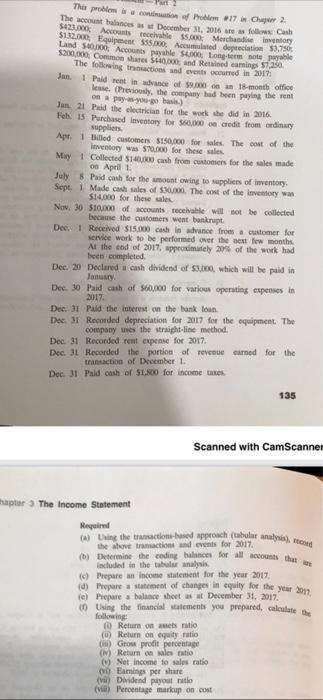Answered step by step
Verified Expert Solution
Question
1 Approved Answer
This problem is a condition of Problem #17 in Chaper 2. The account balances as at December 31, 2016 are as follows: Cash $423,000

This problem is a condition of Problem #17 in Chaper 2. The account balances as at December 31, 2016 are as follows: Cash $423,000 Accounts receivable $5,000, Merchandise inventory $132.000 Equipment $55,000, Accumulated depreciation $3.75 Land $40,000; Accounts payable $4,000, Long-term note payable $200,000 Common shares $440,000, and Retained earnings $7,250 The following transactions and events occurred in 2017 Jan. 1 Paid rent in advance of $9,000 on an 18-month office lease. (Previously, the company had been paying the rent on a pay-as-you-go basis) Jan 21 Paid the electrician for the work she did in 2016. Feb. 15 Purchased inventory for $60,000 on credit from ordinary suppliers Apr. 1 Billed customers $150,000 for sales. The cost of the inventory was $70,000 for these sales May 1 Collected $140,000 cash from customers for the sales made on April 1 July 8 Paid cash for the amount owing to suppliers of inventory. Sept. 1 Made cash sales of $30,000. The cost of the inventory was $14,000 for these sales Nov. 30 $10,000 of accounts receivable will not be collected because the customers went bankrupt Dec. 1 Received $15,000 cash in advance from a customer for service work to be performed over the next few months At the end of 2017, approximately 20% of the work had been completed. Dec. 20 Declared a cash dividend of $3,000, which will be paid in January Dec. 30 Paid cash of $60,000 for various operating expenses in 2017. Dec. 31 Paid the interest on the bank loan. Dec. 31 Recorded depreciation for 2017 for the equipment. The company uses the straight-line method. Dec. 31 Recorded rent expense for 2017. Dec. 31 Recorded the portion of revenue earned for the transaction of December 1. Dec. 31 Paid cash of $1,800 for income taxes. 135 Scanned with CamScanner hapter 3 The Income Statement Required (a) Using the transactions-based approach (tabular analysis), reced the above transactions and events for 2017. (b) Determine the ending balances for all accounts that included in the tabular analysis (c) Prepare an income statement for the year 2017, (d) Prepare a statement of changes in equity for the year 2017 (e) Prepare a balance sheet as at December 31, 2017. (0) Using the financial statements you prepared, calculate the following () Return on amets ratio: (0) Return on equity ration (i) Gross profit percentage () Return on sales ratio () Net income to sales ratio (vi) Earnings per share (vi) Dividend payout ratio (vii) Percentage markup on cost
Step by Step Solution
There are 3 Steps involved in it
Step: 1

Get Instant Access to Expert-Tailored Solutions
See step-by-step solutions with expert insights and AI powered tools for academic success
Step: 2

Step: 3

Ace Your Homework with AI
Get the answers you need in no time with our AI-driven, step-by-step assistance
Get Started


